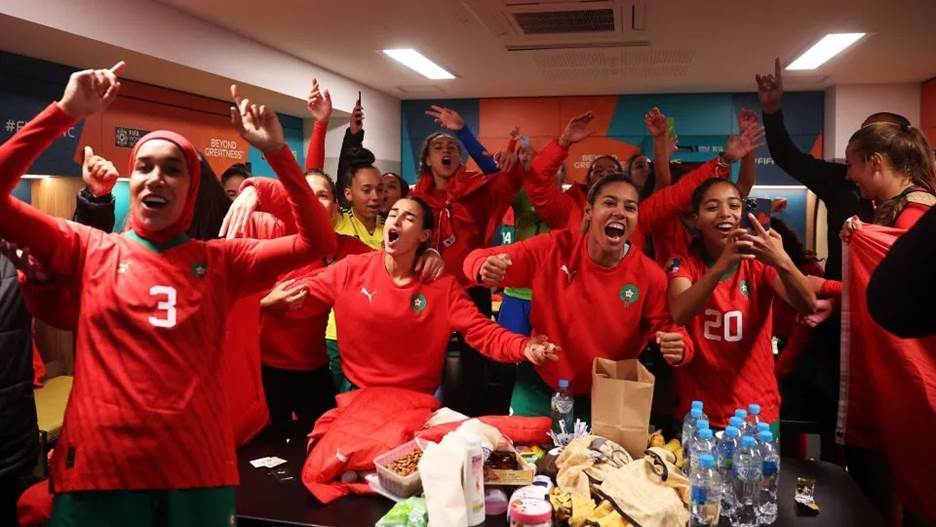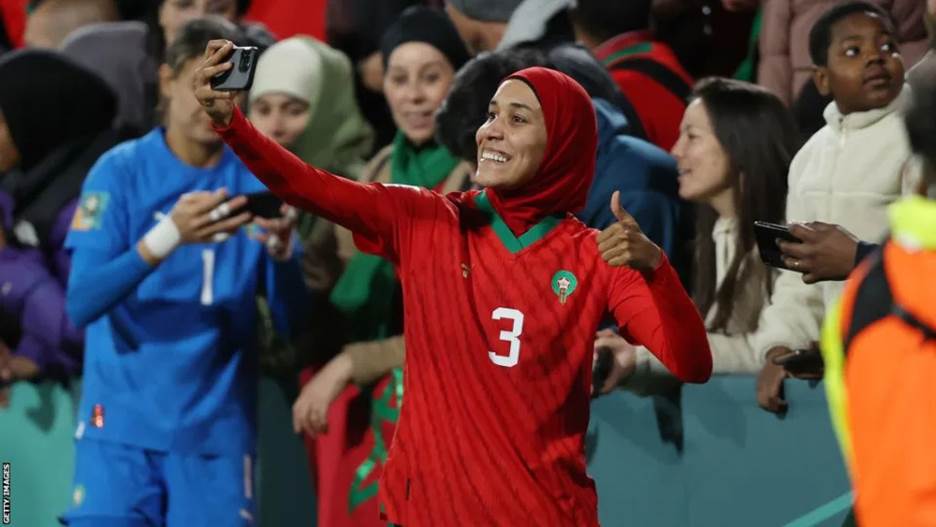
This has been called the World Cup of firsts, of surprises and upsets. Morocco's underdog story is up there as one of the most historic moments of this tournament and possibly of the women's game
Women's World Cup 2023: How Morocco Has Made History again
By Shaimaa Khalil
BBC News
Sydney
"They beat us 6-0. They're out and we’re in," a Moroccan fan said looking straight at the camera in tears and disbelief.
After the roughest of starts in this tournament her side had beaten Colombia in Perth and, coupled with Germany's failure to defeat South Korea, Morocco were through to the knockout rounds.
When the news that the two-time champions were out reached the Moroccan team huddle, it erupted in joy. Players were jumping, others were on the ground in tears, looking to the sky.
It was the moment the Atlas Lionesses realized they'd made history. Again.
Morocco is now the first Arab women's team and the only debutants to make it to the last 16 of the World Cup.
Headlines read: "This is how history is written" and "Another Moroccan triumph".
On social media, pictures of ecstatic Moroccan players were juxtaposed with those of a stunned German team - yet another tournament favorite to leave earlier than expected.
This has been called the World Cup of firsts, of surprises and upsets. Morocco's underdog story is up there as one of the most historic moments of this tournament and possibly of the women's game.
"Nothing is impossible in football," defender Nouhaila Benzina told reporters after the win over Colombia.
"Al Hamdulillah - thank God," she said. "We were one team. We attacked as one, we defended as one. We made Moroccans proud and made ourselves proud. And we still have a job to do."
That 'job' is to face France.
The feat follows the World Cup achievement of the Moroccan men's team at Qatar 2022. The Atlas Lions were the first Arab and African team to make it to the semi-finals.
"The men started it, and the women are carrying on," a fan told Moroccan TV 2M.
You can feel the same momentum building around the women's team. They've been enjoying home support since they made it to the Women's Africa Cup of Nations final (Wafcon) in front of a record home crowd in 2022.
Some of the chants here in Australia are the same as those that rang out in Qatar: "This is only the start! More to come! More to come!"
"In the outcome of the [World Cup] games, they were celebrated similarly [to the men]. But the general public is still discovering those girls and their stories," says Moroccan sports journalist Amine el Amri.
The Atlas Lionesses are trailblazers. Regardless of their result against France, Morocco's women's team have already made history.
The significance for young women around the Arab and Islamic world of seeing a team represent their region with a player competing on one of the world's biggest stages with a hijab, and the confidence and joy they have projected as a collective, cannot be overstated.
Benzina is the first player in the Women's World Cup to compete wearing a hijab [headscarf].
"These may not be the best football performances, but these players have the best spirit. There was heart in every interaction with the opponent," says El Amri.
"People really appreciated the mindset that drove their comeback after losing the first game 6-0 [against Germany].
"Everybody just felt like it was Qatar 2022 all over again. For some, waiting for the Germany-Korea game to finish was like watching the penalty shootout against Spain in the men's World Cup."
The investment is paying off
The recent Moroccan football project can be traced back to 2009 when King Mohammed VI - an avid football fan - opened a football academy, with a training complex following 10 years later. The idea was to create a new generation of footballers able to compete at the highest level and to open the door for more women.

Nouhaila Benzina is the first player to wear a hijab at a World Cup
"The authorities understood the importance and the impact of football as a social vehicle, a source of entertainment and soft power. They invested big money," says El Amri.
This investment has started to pay off, but El Amri says the growth is also down to the dedication and talent of the players.
Now, like their male counterparts, the Moroccan women's national team will face the might of France.
The men were knocked out of the semi-finals in Qatar 2022 by Les Bleus. Even the staunchest of supporters would say the Atlas Lionesses' chances against an experienced and tactical team like France are slim.
There are also cultural and historical tensions at play. The shadows of a violent colonial past always hover over games between them, making them more charged than others.
French journalist Philippe Guibert called Benzina's hijab 'regressive' , while France's highest administrative court rejected an appeal by Muslim players to reverse the French Football Federation's hijab ban.
"On social media, people are looking forward to this game because of the general context, especially when some French pundits criticized Nouhaila Benzina's hijab," says El Amri.
Their biggest wish, he says, is for Benzina to score a winning goal against France.
The strength and talent of the French side cannot be ignored, but El Amri adds: "Sometimes it's about believing in your dreams. There's always a chance to go further. It's the Moroccan spirit." - BBC News

